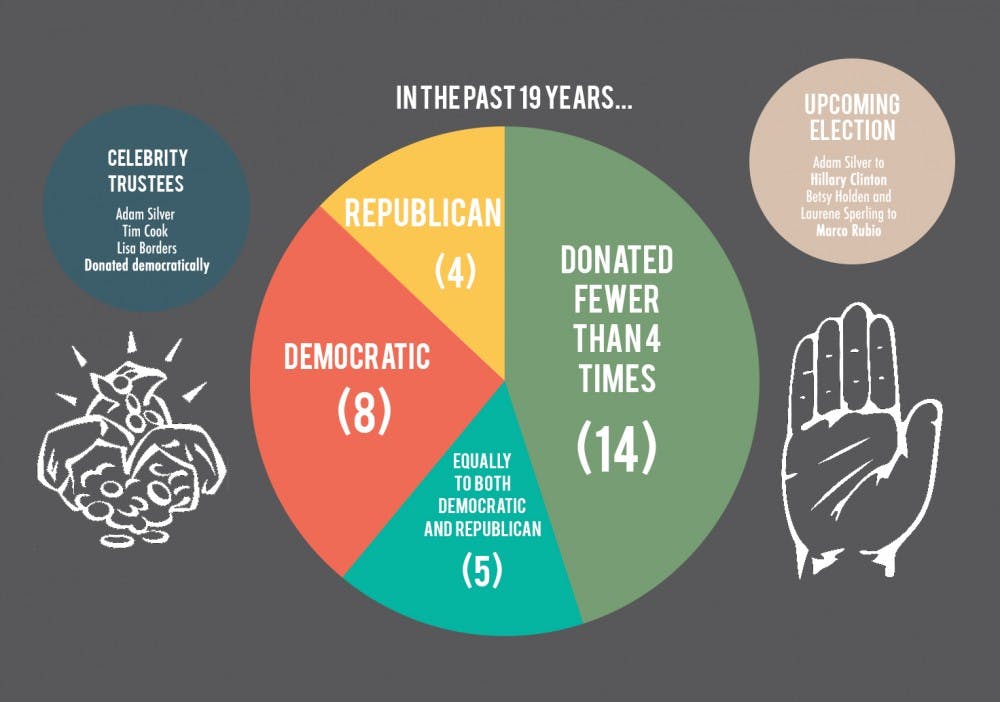Members of Duke’s Board of Trustees appear divided in their political affiliations, based on donations.
In an analysis of the political donation history of Duke’s board members, four Trustees donated primarily to national Republican candidates from 1998 to the present, while eight Trustees supported mostly Democratic candidates. Notably, five Trustees have donated almost equally to both Republican and Democratic candidates and 14 Trustees have donated fewer than four times in the past 19 years. Young Trustees were excluded from the analysis.
The Board of Trustees carries out the strategic plan of the University and finalizes new academic offerings. Of the 36 total members, 24 are elected by the Board of Trustees itself and 12 are elected by Duke graduates.
Political campaign donation data was compiled from the Federal Election Commission’s website, which lists the limit an individual can donate to a candidate’s committee as $2,700. Under FEC guidelines, individuals may also donate to political action committees, capped at $5,000 per election cycle.
Many Trustees donated to candidates across the political spectrum, a phenomenon which Bill Eacho, visiting professor of the practice in the Sanford School of Public Policy, described in an email as a common political trend.
“Most people give to candidates they like,” he wrote. “Either ones they know personally or whose views they agree with. Don’t assume because they give to both parties that means [they’re supporting] opposing views.”
Among the trustees who donated to both Republicans and Democrats were Ralph Eads, vice chairman of Jeffries & Company, Inc., Gerald Hassell, chairman and CEO of the Bank of New York Mellon and David Rubenstein, Trinity ‘70 and co-founder and co-CEO of the Carlyle Group. Rubenstein is currently chair of the Board of Trustees but will be stepping down in July 2017.
The four Trustees who have historically shown strong Republican support include two current corporate or financial executives, Allyson Duncan, a judge on the U.S. Court of Appeals for the Fourth Circuit, and Jack Bovender, Trinity ’67 and retired chief executive officer of the Hospital Corporation of America. Bovender is vice chair of the Board of Trustees and is leading the search committee for President Richard Brodhead’s replacement.
Trustees have also recently helped support the upcoming election. NBA commissioner Adam Silver has donated twice to Democratic presidential nominee Hillary Clinton. Trustees Betsy Holden—senior advisor to McKinsey & Company—and Laurene Sperling—president of the Sperling Family Charitable Foundation—both contributed to Republican Marco Rubio during his bid for the nomination.
Several of the Board’s most well-known members, such as Adam Silver, Apple CEO Tim Cook, WNBA president Lisa Borders and public health expert Dr. Paul Farmer, all donated primarily to democratic campaigns.
In 2009, several Trustees also donated to senatorial candidate Steven Pagliuca, co-chairman of Bain Capital and current Trustee.
Trustees varied widely in their style of donation, with some mostly donating directly to candidate campaigns and others funding candidates through independent and corporate political action committees. Most donors typically give through these two avenues, Eacho wrote.
“Most people donate to campaigns within the limit; [it’s] much cheaper,” he wrote. “Most people only donate to a PAC if it pursues a goal they agree with. They will then give to campaigns where they see alignment. That is easier for me than to write a check to several campaigns.”
Although the majority of citizens donate through these avenues, some also contribute to groups operating through 501(c)(4) section of the IRS code, which means they are not required to disclose donors.
Unlike candidate campaigns and PACs, 501(c)(4) groups are not required to disclose their donor lists. Thus, donating to such groups for political purposes has become more common in the past few years and is pursued by “mostly very wealthy people,” Eacho wrote.
Richard Schmalbeck, Simpson Thacher and Bartlett professor of law, added that the question of whether Trustees have participated in such organizations is unclear.
“I wouldn’t want to suggest that any of our board members actually are participating in campaign activity through a 501(c)(4) organization,” he wrote. “I have no information on that at all. But since anyone can do it, it cannot be dismissed as a possibility.”
Get The Chronicle straight to your inbox
Signup for our weekly newsletter. Cancel at any time.

